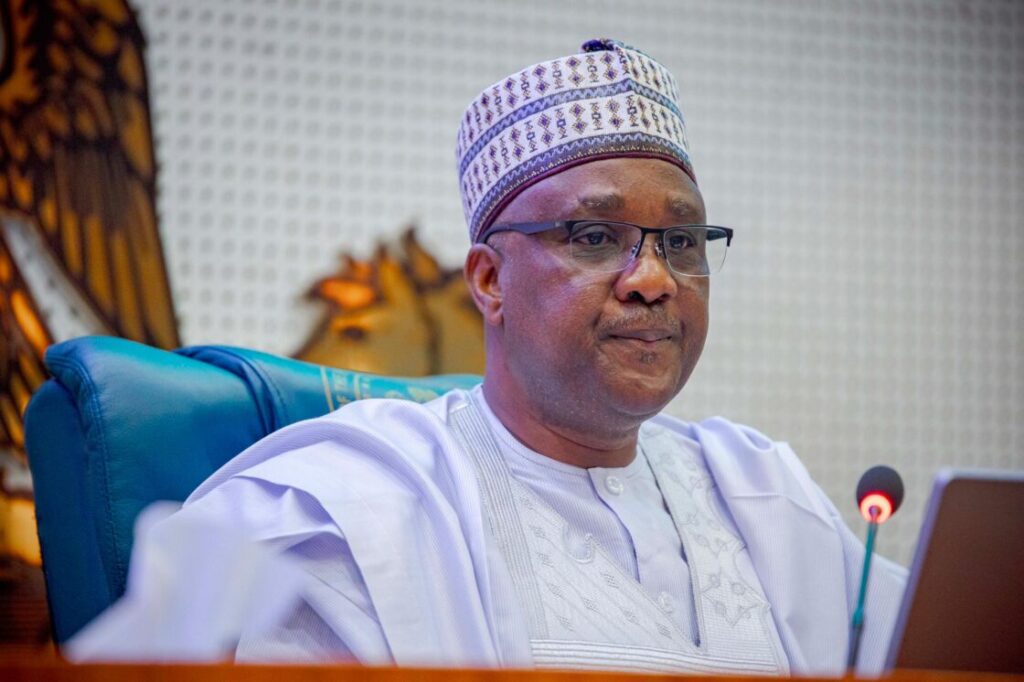The Speaker of the House of Representatives, Tajudeen Abbas, has emphasized the need for improved border controls, stating that Nigeria’s porous borders expose the country to the challenges faced by its West African neighbors.
While advocating for stronger socio-economic and security relations with countries in the region, Speaker Abbas called for enhanced national cohesion within Nigeria.
“For Nigeria, porous borders mean its security is inseparable from that of its neighbors. Continued support for joint patrols, the standby force concept, and regional initiatives, such as grazing corridors, will strengthen resilience across West Africa and at home,” he stated.
Speaker Abbas made the remarks during his keynote lecture at the Royal College of Defence Studies (RCDS) Engagement with the Nigerian National Defence College, Course 33, held at the National Defence College in Abuja on Tuesday. The lecture was titled “National Resilience and Security in the 21st Century.”
In discussing Africa and the Economic Community of West African States (ECOWAS), and the regional context of resilience and security, the Speaker noted that national resilience and security are deeply influenced by regional dynamics within Africa and ECOWAS.
He pointed out that African states are facing challenges such as insurgencies in the Sahel, constitutional crises in Mali, Guinea, Burkina Faso, and Niger, economies heavily dependent on commodities, health emergencies like Ebola and COVID-19, and severe climate impacts.
“Yet African societies consistently demonstrate adaptability, from post-conflict recovery in Rwanda and Sierra Leone to navigating economic hardship. The African Development Bank’s 2022-2026 Strategy emphasizes that strengthening institutions, communities, and investments collectively builds shared resilience,” Abbas added.
The Speaker also referenced the African Union’s Peace and Security Architecture, including early warning systems, mediation efforts, and the standby force, as well as initiatives such as the Great Green Wall and ECOWAS drought resilience plans. These efforts highlight the need for a coordinated approach to security, environmental, and developmental challenges.
Abbas emphasized that ECOWAS has consistently acted to contain crises in the region, deploying missions in Liberia, Sierra Leone, and Ivory Coast, and leading the 2017 Gambian intervention to uphold election results under Nigerian leadership.
“A wave of recent coups now tests the sub-region’s commitment to constitutional governance, prompting sanctions, negotiations, and proposals for a dedicated ECOWAS standby force to deter unlawful power seizures,” he stated.
The Speaker also discussed the importance of economic integration measures such as plans for a common currency, solidarity funds, and coordinated health procurements during the pandemic, all of which enhance regional stability by facilitating resource flows.
He said: “An effective resilience strategy follows three integrated phases: mitigation, adaptation, and recovery. Mitigation involves proactive measures such as flood defenses, robust building standards, preventive diplomacy, and deradicalization programs to reduce risks before they occur.
“Adaptation acknowledges that some shocks are unavoidable and builds capacity to cope through drought-resistant crops, emergency communications drills, and diversified energy sources.
“Recovery restores and strengthens communities and systems through relief efforts, infrastructure rebuilding, the reintegration of affected populations, and economic stimulus, while embedding lessons learned to address future vulnerabilities. By treating these phases as a continuous cycle, each recovery informs better mitigation and adaptation, ensuring that past crises guide future security planning.”
Speaker Abbas also highlighted how Nigeria’s key policy frameworks now follow an integrated cycle of mitigation, adaptation, and recovery. He noted that the National Disaster Management Framework mandates preparedness at every level and coordinated response and recovery through the National Emergency Management Agency (NEMA), in collaboration with local and international partners.
He explained that the National Adaptation Plan provides a long-term roadmap to reduce climate vulnerabilities, while the National Security Strategy unites prevention, protection, and crisis response across all ministries, agencies, and civil society in a whole-of-society approach.
“To strengthen this integration, Nigeria could further intensify joint scenario planning and annual national risk assessments, where sectors such as finance, health, agriculture, environment, and defense present shared threat registers and align their mitigation, adaptation, and recovery measures. This is similar to the UK’s National Resilience Framework and its National Risk Register,” he said.
The Speaker concluded that achieving true resilience requires political will and resources for less visible prevention work, as well as fostering a culture of preparedness among citizens, businesses, and communities. He emphasized that by preventing what can be prevented, preparing for what cannot, and recovering swiftly from unavoidable shocks, Nigeria can turn every crisis into an opportunity to strengthen the nation.
Abbas added that national resilience and security are mutually reinforcing, forming the foundation for addressing the challenges of the 21st century and safeguarding citizens’ welfare. He said: “National strength depends on prevention, endurance, and quick recovery across all sectors to protect and empower citizens. Success is demonstrated by minimal loss and rapid restoration through early warning systems, economic resilience, or cyber defense, along with long-term improvements in health, education, and equity.”
“A society-wide approach, supported by strong legislation and citizen engagement, will ensure that our resilience bolsters our security, and our security, in turn, fosters our resilience, securing Nigeria’s future.”















